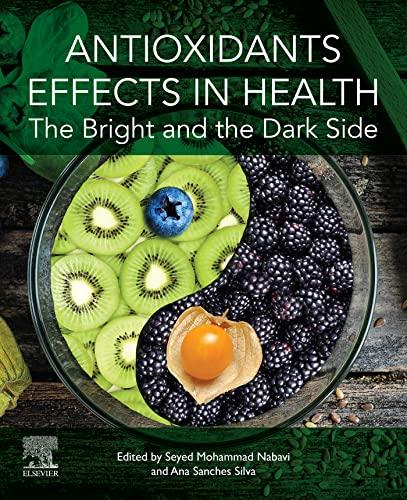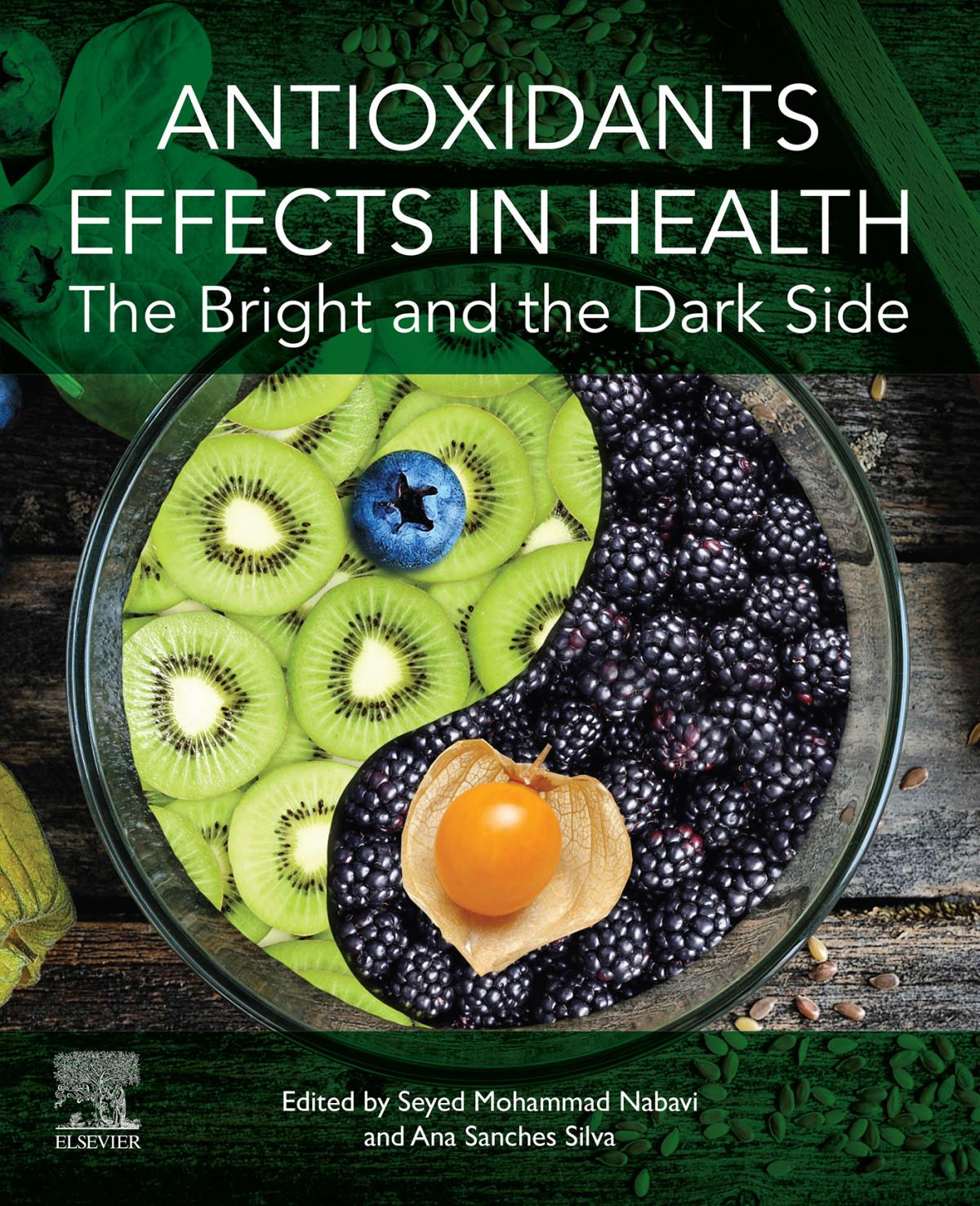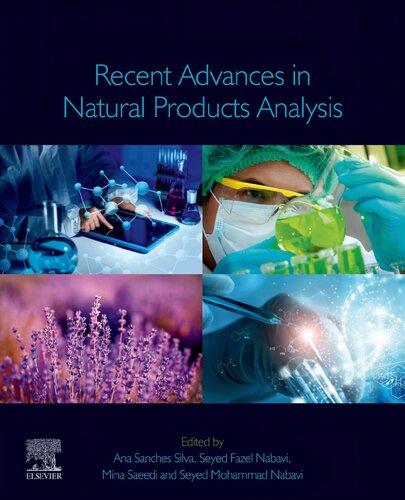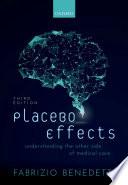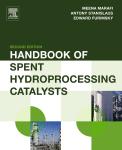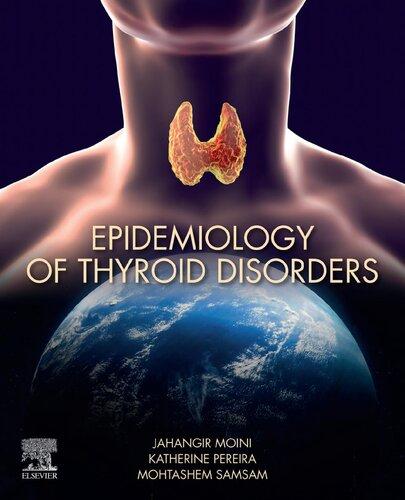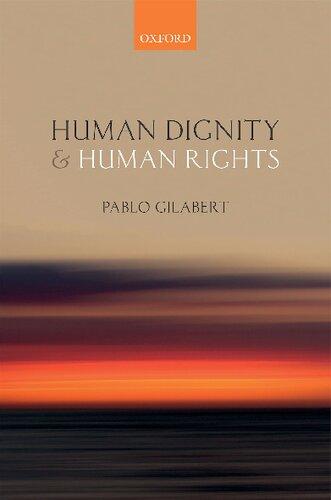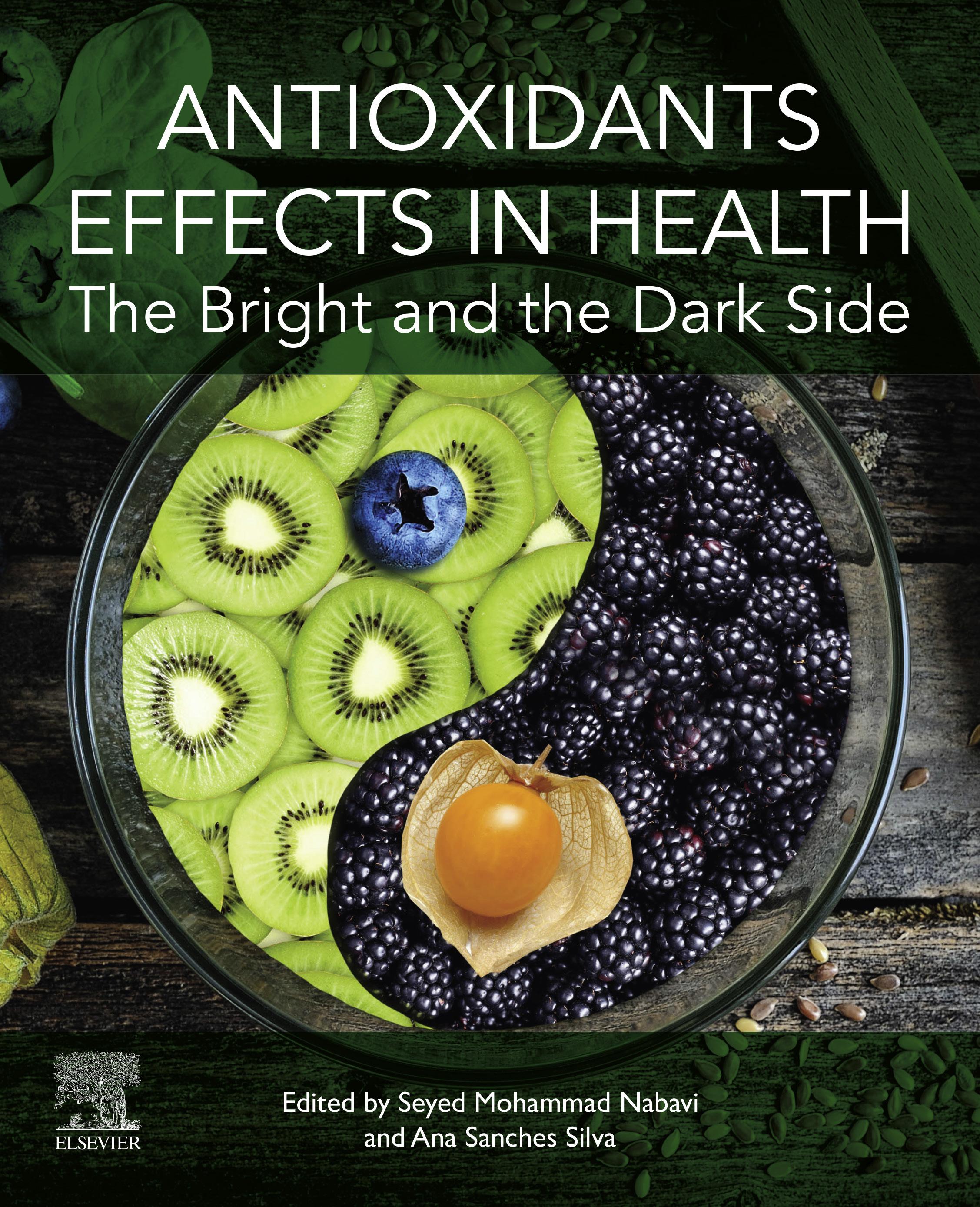Antioxidants Effects in Health
The Bright and the Dark Side
Edited by
Seyed Mohammad Nabavi
Baqiyatallah University of Medical Sciences, Iran
Ana Sanches Silva
National Institute of Agrarian and Veterinary Research (INIAV, I.P.) and Center for Study in Animal Science (CECA), Porto, Portugal
Elsevier
Radarweg 29, PO Box 211, 1000 AE Amsterdam, Netherlands
The Boulevard, Langford Lane, Kidlington, Oxford OX5 1GB, United Kingdom 50 Hampshire Street, 5th Floor, Cambridge, MA 02139, United States
Copyright © 2022 Elsevier Inc. All rights reserved.
No part of this publication may be reproduced or transmitted in any form or by any means, electronic or mechanical, including photocopying, recording, or any information storage and retrieval system, without permission in writing from the publisher. Details on how to seek permission, further information about the Publisher’s permissions policies and our arrangements with organizations such as the Copyright Clearance Center and the Copyright Licensing Agency, can be found at our website: www.elsevier.com/permissions
This book and the individual contributions contained in it are protected under copyright by the Publisher (other than as may be noted herein).
Notices
Knowledge and best practice in this field are constantly changing. As new research and experience broaden our understanding, changes in research methods, professional practices, or medical treatment may become necessary.
Practitioners and researchers must always rely on their own experience and knowledge in evaluating and using any information, methods, compounds, or experiments described herein. In using such information or methods they should be mindful of their own safety and the safety of others, including parties for whom they have a professional responsibility.
To the fullest extent of the law, neither the Publisher nor the authors, contributors, or editors, assume any liability for any injury and/or damage to persons or property as a matter of products liability, negligence or otherwise, or from any use or operation of any methods, products, instructions, or ideas contained in the material herein.
ISBN: 978-0-12-819096-8
For Information on all Elsevier publications visit our website at https://www.elsevier.com/books-and-journals
Publisher: Stacy Masucci
Acquisitions Editor: Andre G. Wolff
Editorial Project Manager: Zsereena Rose Mampusti
Production Project Manager: Maria Bernard
Cover Designer: Victoria Pearson
Typeset by Aptara, New Delhi, India
I dedicate this book to my mother, Seyed Maryam Nabavi and my brother Seyed Fazel Nabavi
Seyed Mohammad Nabavi
To my beloved sons and husband, Maria Inês, João, and Ricardo
To Maria Lucília and Jacinto for their priceless support and never-ending love
Ana Sanches Silva
PART 1 Introduction
PART 2 Endogenous antioxidants
2.1
CHAPTER
2.2 Catalase ............................................................. 81
Mohamad Fawzi Mahomoodally, Daphne Désiré A.-L., Elodie Rosette M. A.-L.
2.2.1 Introduction................................................................................. 81
2.2.2 Endogenous and exogenous sources ........................................... 82
2.2.3 Catalase: Importance, benefits, and activity ............................... 82
2.2.3.1 Catalase therapy in diabetic retinopathy ........................ 83
2.2.3.2 Catalase therapy in cancer treatment ............................. 83
2.2.3.3 Catalase therapy in cardiac patients 83
2.2.4 Impact of physiological, behavioral and environmental factors on catalase activity 83
2.2.5 Role of catalase as a biomarker for oxidative stress ................... 84
2.2.6 Mechanism of action of catalase 84
2.2.7 In vitro and in vivo studies.......................................................... 85
2.2.8 Clinical Study 86 Conclusion .............................................................................................. 87 References 88
CHAPTER 2.3 Coenzyme Q: An endogenous antioxidant .............. 91
Rajeshwar K.K. Arya, Prashant Kumar, Anita Singh, Mahendra Rana, Amita J. Rana, Aadesh Kumar
2.3.1 Introduction 91
2.3.2 Mechanism of action of coenzyme Q10 .....................................
2.3.3
2.3.4 Beneficial effects.........................................................................
2.3.4.1 Can endogenous antioxidants be detrimental for human health; in what extant? ....................................... 94
2.3.4.2 Beneficial effect of CoQ10 as evidenced by clinical studies ................................................................ 95
2.3.5 In-vitro and in-vivo studies 97 Conclusion .............................................................................................. 99
CHAPTER 2.4 Ferritin ............................................................. 105
Mohamad Fawzi Mahomoodally , Joomun B. Fatimah-Tuz-Zohra
2.4.1 Introduction............................................................................... 105
2.4.2 Serum ferritin level as a diagnostic biomarker 106
2.4.3 Role of ferritin in Fe homeostasis ............................................. 109
2.4.4 Ferritin and oxidative stress 109 Conclusion ............................................................................................ 111 References 111
CHAPTER 2.5 Glucose-6-phosphate-dehydrogenase
Mohamad Fawzi Mahomoodally, Chundoo B. Azeemah
CHAPTER 2.6 Melatonin .........................................................
Mohammad Hossein Asghari, Milad Moloudizargari
2.7
2.6.3.1
2.7.3
2.7.4
dismutase
Arnab Karmakar, Abhishek K. Das, Noyel Ghosh, Parames C.
2.7.6.4
2.7.6.5
2.7.6.6 Superoxide dismutase in ischemia-reperfusion injury ... 152
2.7.6.7 Superoxide dismutase and neurological disorders ....... 153
2.7.6.8 Superoxide dismutase in gastrointestinal disorders ..... 154
2.7.6.9 Superoxide dismutase in inflammatory disorders ........ 154
2.7.7 Adverse effects of superoxide dismutase .................................. 155
2.7.8 Optimum dose, route of administration, and limitations of therapeutic use of superoxide dismutase ..............................
CHAPTER 2.8 Uric acid ..........................................................
Mohamad Fawzi Mahomoodally, Daphne Désiré A.-L., Sanaa Dilmar A., Elodie Rosette M. A.-L.
2.8.1 Introduction...............................................................................
2.8.2
2.8.3
2.8.4
2.8.4.1
2.8.4.2
2.8.4.3
2.8.4.4
2.8.5
2.8.5.1
2.8.5.2
2.8.5.3
2.8.6 Detrimental
2.8.6.1
2.8.6.2 Eclampsia
2.8.6.3 Gout..............................................................................
2.8.6.4
PART 3 Synthetic antioxidants: bright and the dark side
CHAPTER 3.1 Ascorbyl
Renald Blundell, Muhammad Ajmal Shah, Joseph I. Azzopardi, Amira Y. Benmelouka, Mohammed Alqarni, Haroon Khan
3.1.1
3.1.2
3.1.3
CHAPTER 3.2 Butylated hydroxyanisole ...................................
Renald Blundell, Muhammad Ajmal Shah, Joseph I. Azzopardi, Amira Y. Benmelouka, Azhar Rasul, Norah A. Althobaiti
3.2.1
Renald Blundell, Muhammad Ajmal Shah, Joseph I. Azzopardi, Shabnoor Iqbal, Akhtar Rasul, Ghulam Mujtaba Shah 3.3.1
CHAPTER 3.4 Erythorbic acid (D-ascorbic acid) ....................... 201
Renald Blundell, Muhammad Ajmal Shah, Joseph I. Azzopardi, Shabnoor Iqbal, Tapan Behl, Abdul H. Khan
3.4.1
CHAPTER 3.5 Nordihydroguaiaretic acid ................................. 207
Renald Blundell, Muhammad Ajmal Shah, Joseph I. Azzopardi, Shabnoor Iqbal, Akhtar Rasul, Zunera Chauhdary
3.5.1 Chemistry ..................................................................................
3.5.2 Synthesis ...................................................................................
3.5.3
3.5.4
3.5.5
CHAPTER 3.6 Octyl gallate ..................................................... 215
Renald Blundell, Muhammad Ajmal Shah, Joseph I. Azzopardi, Shabnoor Iqbal, Reem Hasaballah Alhasani, Ghulam Mujtaba Shah
3.6.1 Chemistry ..................................................................................
3.6.2
3.6.3
3.6.4
3.6.5
CHAPTER 3.7 Propyl gallate ................................................... 221
Renald Blundell, Muhammad Ajmal Shah, Joseph I. Azzopardi, Shabnoor Iqbal, Malik Saad Ullah, Shahid Rasool
3.7.1 Chemistry .................................................................................. 221
3.7.2 Synthesis ................................................................................... 221
3.7.3
3.7.4
3.7.5
CHAPTER 3.8 Tert-butylhydroquinone ...................................... 227
Renald Blundell, Muhammad Ajmal Shah, Joseph I. Azzopardi, Zunera Chauhdary, Shahid Shah, Ghulam Mujtaba Shah
3.8.1 Chemistry .................................................................................. 227
3.8.2 Synthesis ................................................................................... 227
3.8.3
PART 4 Natural occurring antioxidants: bright and the dark side
CHAPTER 4.1 Amino acid: Essential builiding blocks
Dheeraj Bisht, Harikesh Maurya, Tanuj Joshi, Tarun Belwal, Arasana Dhariwal, Aadesh Kumar
CHAPTER 4.2 Carnosine
Mohamad Fawzi Mahomoodally, Sanaa Dilmar A., S. Khatoon Khadaroo 4.2.1
4.2.3.1
4.2.3.2 Combating and preventing neurological issues ........... 259
4.2.3.3 Carnosine against cancer and side effects .................... 260
4.2.3.4 Carnosine and its effect on aging ................................. 261
4.2.4 Application of carnosine ........................................................... 261
4.2.4.1 Ergogenic aid in sports ................................................. 261
4.2.5 Studies demonstrating antioxidative properties of carnosine ... 264
4.2.5.1 Detrimental effects of carnosine on health ..................
............................................................................................
CHAPTER 4.3
Xiuping Chen
4.3.2 Source and chemistry ................................................................
4.3.3 Bioavailability and toxicity .......................................................
4.3.4 Antioxidant and pro-oxidant activities .....................................
4.3.5 Pharmacological effects and underlying mechanisms ..............
4.3.5.1 Anticancer ....................................................................
4.3.5.2 Neuroprotective ............................................................
........................................................................................
CHAPTER 4.4 Carotenoids (Xanthophylls and Carotenes) .......... 279
Koula Doukani, Ammar S.M. Selles, Hasna Bouhenni, Meriem Chafaa, Leila Soudani
4.4.1 Carotenoids ...............................................................................
4.4.2 Chemical composition ..............................................................
4.4.3 Sources of carotenoids .............................................................. 281
4.4.3.1 Carotenes......................................................................
4.4.3.2 Xanthophylls ................................................................
4.4.4 Carotenoids accumulation and bioavailability ..........................
4.4.5 Beneficial and detrimental effects of carotenoids on health
4.4.5.1 Beneficial effects ..........................................................
4.4.5.2 Detrimental effects
4.4.6 Toxicity of carotenoids .............................................................
4.4.7 In-vitro evidence, animal studies, and clinical studies of carotenoids ................................................................................ 294
........................................................................................
Sushil Kumar Singh, Rahul Kaldate, Arti Bisht
Ziyad Khan, Haroon Khan, Marya, Muhammad Ajmal Shah
Hari P. Devkota, Anjana Adhikari-Devkota, Dhaka R. Bhandari
4.7.5
CHAPTER 4.8
Lingchao Miao, Haolin Zhang, Li Yang, Lei Chen, Yixi Xie, Jianbo Xiao
4.8.1
4.8.2
4.8.3
4.8.4
4.8.4.1
4.8.4.2
4.8.4.4
4.8.5
4.8.6
4.8.6.1
4.8.6.2
4.8.7.1
4.8.7.2
4.8.7.3
4.8.7.4
4.8.8
4.8.8.1
4.8.8.2
4.8.8.3
4.9.1
4.9.2
Shahira M. Ezzat, Mohamed A. Salem, Nihal M. El Mahdy, Marwa M. Mahfouz
CHAPTER 4.10 Lignans ..........................................................
Juan M. Álvarez-Caballero, Ericsson Coy-Barrera
CHAPTER 4.11 Organosulfur compounds (allyl sulfide, indoles) ... 417
Mohamad Fawzi Mahomoodally, Nouzaifa Nabee, Baureek Nawshin
4.11.1
4.11.3
Hari P. Devkota, Anjana Adhikari-Devkota 4.12.1
CHAPTER 4.13 Phytic acid: As a natural antioxidant ................ 437
Jyoti Upadhyay, Nidhi Tiwari, Sumit Durgapal, Arvind Jantwal, Aadesh Kumar
4.13.1
4.13.2
4.13.3
4.13.5
CHAPTER 4.14
Mohamad Fawzi Mahomoodally, Meeajan M. Irfaan
CHAPTER 4.15
Tanuj Joshi, Sumit Durgapal, Vijay Juyal, Arvind Jantwal, Mahendra Rana, Aadesh Kumara
CHAPTER 4.16 Sterols: benificial or detrimental for human helath.................................................. 475
Tanuj Joshi, Kiran Patni, Tarun Belwal, Harikesh Maurya, Aadesh Kumar
4.16.1 Sterols and their role as antioxidants ..................................... 475
4.16.2 Bright side of sterols .............................................................. 477
4.16.2.1 Beneficial effect of sterols as evidenced by in vitro and animals studies..................................... 477
4.16.2.2 Beneficial effect of phytosterols as evidenced by clinical studies ................................................... 479
4.16.3 Dark side of sterols: Adverse effects and toxicity 480 Conclusion .......................................................................................... 482 References 482
CHAPTER 4.17 Tartaric acid ................................................... 485
Arvind Jantwal, Sumit Durgapal, Jyoti Upadhyay, Tanuj Joshi, Aadesh Kumar
4.17.1 Introduction ............................................................................ 485
4.17.2 Classification of natural antioxidants ..................................... 485
4.17.3 Source of tartaric acid ............................................................ 487
4.17.4 Pharmacological activity of tartaric acid ............................... 489
4.17.5 Toxicity studies of tartaric acid 489 Conclusion .......................................................................................... 490 References 490
CHAPTER 4.18 Turmeric......................................................... 493
Filippo Maggi
4.18.1 Introduction ............................................................................ 493
4.18.2 Etymology .............................................................................. 493
4.18.3 Systematics ............................................................................ 494
4.18.4 Distribution ............................................................................ 494
4.18.5 Botanical description ............................................................. 495
4.18.6 Turmeric preparations ............................................................ 495
4.18.7 Uses as dye ............................................................................. 495
4.18.8 Ethnobotany 496
4.18.9 Turmeric metabolites ............................................................. 496
4.18.10 Nutraceutical and medicinal uses 498
4.18.11 Uses as antioxidant ................................................................ 499 Conclusions 501 References............................................................................................. 501
CHAPTER 4.19 Uric acid ........................................................
Sumit Durgapal, Arvind Jantwal, Jyoti Upadhyay, Tanuj Joshi, Aadesh Kumar
CHAPTER 4.20 Vanillin .......................................................... 517
CHAPTER 4.21 Vitamin A ....................................................... 527
Ömer F. Yakıncı, Ipek Süntar
CHAPTER 4.22 Vitamin C ....................................................... 535
Manish Kumar, Vinay Pratap, Jalaj K. Gour, Manoj K. Singh 4.22.1
4.22.4 Chemical structure and biochemistry of vitamin C ............... 536
4.22.5 Biosynthesis of vitamin C in the plants and animals ............. 538
4.22.6 Beneficial effects of vitamin C on health ............................... 539
4.22.7 Anticancer activity of ascorbic acid 539
4.22.8 Antioxidant activity of vitamin C .......................................... 540
4.22.9 Detrimental effects of ascorbic acid on health 541
4.22.10 Pro-oxidant activity of ascorbic acid ..................................... 543 Conclusion 543 References............................................................................................. 544
CHAPTER 4.23
Vitamin E (tocopherols and tocotrienols) (natural-occurring antioxidant; bright and dark side)....................................................... 547
Ziyad Khan, Salman Ahmad, Marya, Hammad Ullah, Haroon Khan
4.23.1 Introduction ............................................................................ 547
4.23.2 Sources 548
4.23.3 Chemistry ............................................................................... 549
4.23.4 Absorption and metabolism 549
4.23.5 Bioavailability ........................................................................ 551
4.23.6 Mechanism of action 552
4.23.7 Possible pro-oxidant activity .................................................. 553
4.23.8 Beneficial effects of vitamin E on health 553
4.23.9 Side effects/unwanted of vitamin E ....................................... 555
4.23.10 In-vitro and in-vivo studies on vitamin E 556 4.23.11 Clinical trial studies ............................................................... 556 Conclusions 557 References............................................................................................. 558
CHAPTER 4.24 Vitamin K
.......................................................
Abhishek K. Das, Sumit Ghosh, Parames C. Sil
561
4.24.1 Introduction 561
4.24.2 General informations about vitamin K .................................. 561
4.24.2.1 Types of vitamin K and structures 561
4.24.2.2 Dietary sources of vitamin K .................................. 563
4.24.2.3 Bioavailability 565
4.24.2.4 Some important information at a glance ................. 565
4.24.3 Cellular metabolism of vitamin K 565
4.24.3.1 Absorption of vitamin K ......................................... 565
4.24.3.2 Storage of vitamin K 566
4.24.3.3 Redox cycling of vitamin K .................................... 566
4.24.4 Vitamin K dependent proteins and their functions 568
Toorabally B. Zaynab, Subratty A. Hussein, Mohamad Fawzi Mahomoodally
PART 5 Antioxidants
Saeideh Momtaz, Shokoufeh Hassani, Amir Hossein Abdolghaffari
5.1.4 Antioxidants; clinical trials in cancer prevention and treatment ............................................................................ 597
5.1.5 Common dietary antioxidants in cancer prevention ................. 598
5.1.5.1 Tea polyphenols and catechin 598
5.1.5.2 Curcumin ....................................................................... 599
5.1.5.3 Resveratrol 600
5.1.5.4 Quercetin ....................................................................... 600
5.1.5.5 Flavonoids 601
5.1.5.6 Other promising dietary antioxidants ............................ 602
5.1.6 Antioxidants for cancer management; cure or threat 603
5.1.7 Antioxidants in combination therapy in combating cancer ...... 604 Conclusion 604 References............................................................................................. 605
CHAPTER 5.2 Antioxidants and cardiovascular diseases .......... 613
Ankita Mandal, Uday Hossain, Parames C. Sil
5.2.1 Introduction 613
5.2.2 Oxidative stress and its role in cardiovascular disease: a brief idea 614
5.2.3 Antioxidants and cardiovascular diseases ................................. 616
5.2.3.1 Vitamins and CVD 618
5.2.3.2 Vitamin E ..................................................................... 618
5.2.3.3 Vitamin C 619
5.2.3.4 â-Carotene and vitamin A ............................................ 621
5.2.4 Polyphenols 622
5.2.4.1 Anthocyanins ............................................................... 622
5.2.4.2 Catechins 624
5.2.4.3 Resveratrol ................................................................... 626 Conclusion 629 Abbreviations ........................................................................................ 630 References 630
CHAPTER 5.3
Antioxidants and cataracts/age-related macular degeneration ........................................ 641
Laxman Singh, Pooja Patni, Archana N. Sah, Devesh Tewari
5.3.1 Introduction 641
5.3.2 Cataract, a global problem ........................................................ 643
5.3.3 Pathophysiology of cataract 643
5.3.4 Role of antioxidants in cataract ................................................ 648 Conclusion 648 Abbreviations ........................................................................................ 648 References 649

